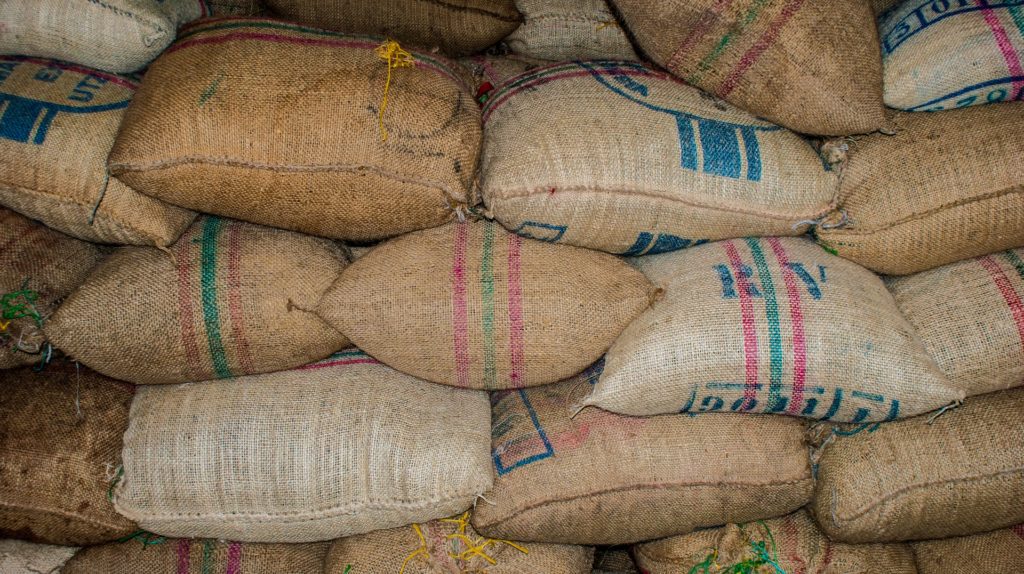The world shipping industry is millennia old. The accumulated experience along with modern technology has provided consumers with assured confidence that the desired products will be available efficiently and expediently.
This is very true regarding coffee logistics. When was the last time you as a consumer wondered if your favourite Yirgacheffe would be lost at sea? Shipping coffee from coffee exporter to coffee importer is quite routine for the larger companies. These corporations move container loads of our precious beans all over the world and they are very good at it.
It is easy to take this service for granted. I did until I started looking into how to export my small offerings to the nations of the world. That opened my eyes and dropped my jaw. What is involved in shipping coffee or the whole coffee logistics chain? How does it work with “direct trade” or others who cannot fill a container? Let’s find out!
Bureaucracy and more Bureaucracy
As can be expected, international logistics on trade items is a lot more complicated than going to the local post office with a gift for an old friend. Governments have an invested interest in knowing what is coming in and what is going out of their countries. There are taxes, duties as well as strict control of what can come in and cannot come in.
Meeting all the requirements for coffee exporters can be quite exasperating, especially for the smaller farm holder. The Ministry of Health has a list of requirements that must be met. The conditions of the dry mills must meet their standards. The swiftness of achieving these permits can vary significantly depending on local traditions of the country you are in and the personality of the agent.
Once you get the health permits you will need the permits from the Ministry of Agriculture for each shipment. Completing the paperwork for each shipment takes time and experience.
For that reason, coffee exporters require the services of customs brokers in their own countries. These people are well trained in all the laws and requirements of their countries. They are also up to date on which freight lines are available and the services they offer.
Now, the coffee exporter or coffee farmer just has to get the coffee to port. For our purposes, we will say that the terms of payment are FOB (Free or Freight on Board). All the expenses up to this point are covered by the coffee exporter or coffee farmer. It is now up to the coffee importer or roaster to manage the rest of the procedure.
This part is a lot less complicated for volume sales. Finding a shipping company to carry a full container of coffee away is not too hard. Arrangements are made and away it goes. Make no mistake about it, nothing happens fast. From the time a deal is made to the time a ship leaves port, two months could go by.
The Direct Trade and Small Farm Holder Blues
Volume sales are the ticket to lessen the stress of coffee logistics and get the best price. All the players are comfy inside their comfort zones doing what they do best. If you want to throw a wrench into things and watch these experts run-a-muck, then try to export only 50 sacks of coffee.

From the farmer’s perspective, there is not a lot of difference. Having permits and using a customs broker still has to be done. The challenge is finding a shipping company that can consolidate the cargo at the best price. In many cases, the coffee exporter or farmer will collaborate with the roaster or direct trade partner. This is logical because the farmer lives in the country of departure and is eager to form a “good relationship” with the roaster.
What happens a lot of times, which is not really fair, is that the roaster or buyer lays this responsibility plainly on the shoulders of the farmer. He makes it a condition of sale. Collaboration is much better and should be emphasized.
Unfortunately, it is a buyer’s market and if it gets too complicated or expensive for the buyer, he just walks away leaving the farmer without a sale or any hope. That flies in the face of developing a “partnership” or “good relationship” no matter what it says on the roaster’s website.
Consolidation and Other Solutions
One of the best solutions to this problem is sharing a container with other coffee exporters. Although it is the best solution, it is difficult to obtain. The chances of farmers selling to the same country at the same time in small producing countries are slim and none.
Some logistics companies such as “Evergreen” ship varied amounts of products all over the world and could easily accommodate varied sizes of cargo. This has its risks, however. Coffee is very delicate and can absorb unwanted or contaminating odours that are trapped inside the containers. Therefore, the logistics agent has to be very precise as to know what is being shipped with the coffee.
Another disadvantage of this kind of transport is that the containers are on what is called “the milk run”. They may make different stops in different ports before it gets to it’s proposed destination.
With every problem and new technology opportunities, there is a way. There are some logistic companies developing such as “Algrano” that specializes in shipping coffee for direct trade customers. This is a fascinating approach that allows the farmers and roasters to make a deal directly using the “Algrano” apps. “Algrano” manages all the logistics which takes a load of the minds of both roasters and farmers.
The coffee chain is indeed long with many links. We just finished analyzing what may be termed an “invisible link”. It is common to take coffee logistics for granted. I used to think of coffee importers and coffee exporters as people who just sat in an office. I never gave it any thought as to how complicated this work really is.
Without a doubt, the logistics of coffee is a crucial link that unites all of us, from coffee farmers to consumers.



I found so much of informations regarding coffee and its tastes. Certainly I would prefer collecting from my friend who is a farmer in coffee.